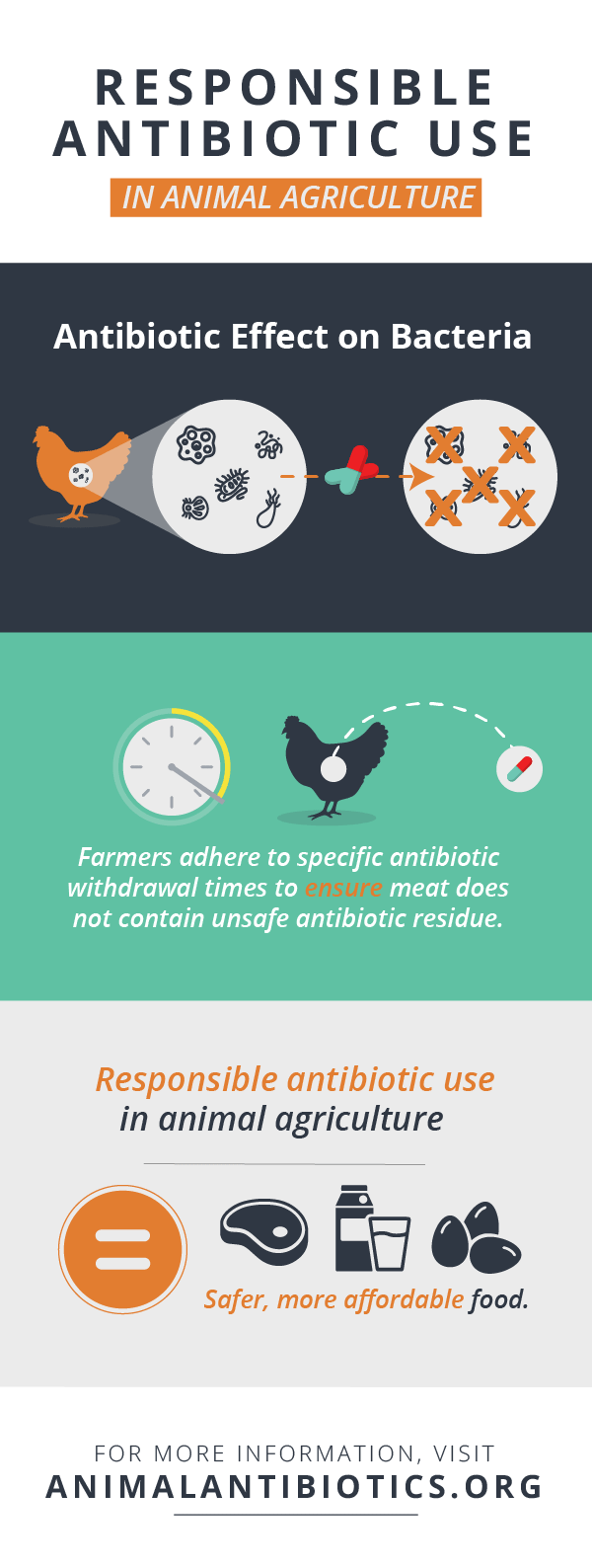Consumer research shows the primary public concern about what we eat is keeping healthy food affordable. Antibiotics used in animal agriculture play an important role in addressing this concern, offering benefits for human health and family grocery budgets.
It is important to recognize right from the start that animal antibiotics must be used responsibly to minimize animal agriculture’s contribution to antibiotic resistance. But, responsible use of animal antibiotics benefits all of us by making food safer and more affordable.
Antibiotics help keep animals healthy and that contributes to safer food. Studies show this reduces bacteria entering the food supply. If we overly restrict the use of antibiotics on the farm, we run the risk of higher death loss on the farm and more condemnations at the processing plant. While government inspections at processing plants will prevent unhealthy animals entering the food supply, we have to be careful and guard against unintended consequences.
There’s a fairly common misconception that treating food animals with antibiotics means the meat, milk and eggs they produce will have medicine in them that would make them unhealthy to feed our families. In fact, there are multiple systems and strict government regulation in place to prevent this. Farmers must adhere to specific withdrawal times that have been established to ensure that meat does not contain unsafe antibiotic residue. The Department of Agriculture and food companies routinely sample meat for antibiotic residue.
Keeping animals healthy has the added benefit of making food more affordable. That’s because healthy animals consume less food and water, which helps keep costs down. More consumers are able to afford meat, dairy products and eggs when farmers are able to maintain the health of their animals.

Still, antibiotic resistance is a serious public health concern shared by the animal health community. That’s why we’re working with the FDA and American Veterinary Medical Association to ensure the responsible use of antibiotics in animals that produce food.
It’s important to better understand the effects of all uses of antibiotics on resistance so strategies can be developed to protect public health, food safety and animal well-being. Eliminating or overly-restricting antibiotics on the farm would be counterproductive.
Antibiotic resistance is a concern health care professionals take seriously. Medical doctors are working to reduce antibiotic use in humans. New FDA guidelines taking effect in 2017 will require veterinarians to oversee antibiotics important to human medicine that are also used to treat, prevent and control disease in animals raised for food.
As a veterinarian, I need to be able to answer questions about antibiotic use in farm animals in an informed and evidence-based way. Based on scientific research and practical experience, I’m completely comfortable telling people that using antibiotics responsibly makes meat, milk and eggs safer with the added benefit of lower food costs.
I welcome your thoughts and questions. Please feel free to send me an email at AskDrDorman@pahc.com or call me at 844-288-3623. You can also browse our Resource Library to learn more about this important topic.
